Business Law Report: Sales of Goods, Consumer Credit & UK Competition
VerifiedAdded on 2024/05/30
|24
|3671
|445
Report
AI Summary
This report provides a comprehensive overview of several key aspects of business law. It begins by examining the legal rules surrounding the sale of goods and supply of services, including implied terms, transfer of property, and remedies for both buyers and sellers, with practical advice for specific scenarios. The report then delves into consumer credit, differentiating between types of credit agreements and agents, and evaluating the rights and duties of agents. Further, it discusses monopolies and anti-competitive practices in the UK, the role of the Competition Commission, and the application of EU exemptions. Finally, the report identifies different forms of intellectual property and outlines the principles relating to patent rights, trademarks, and business names. Desklib provides access to more documents and AI study tools for students.
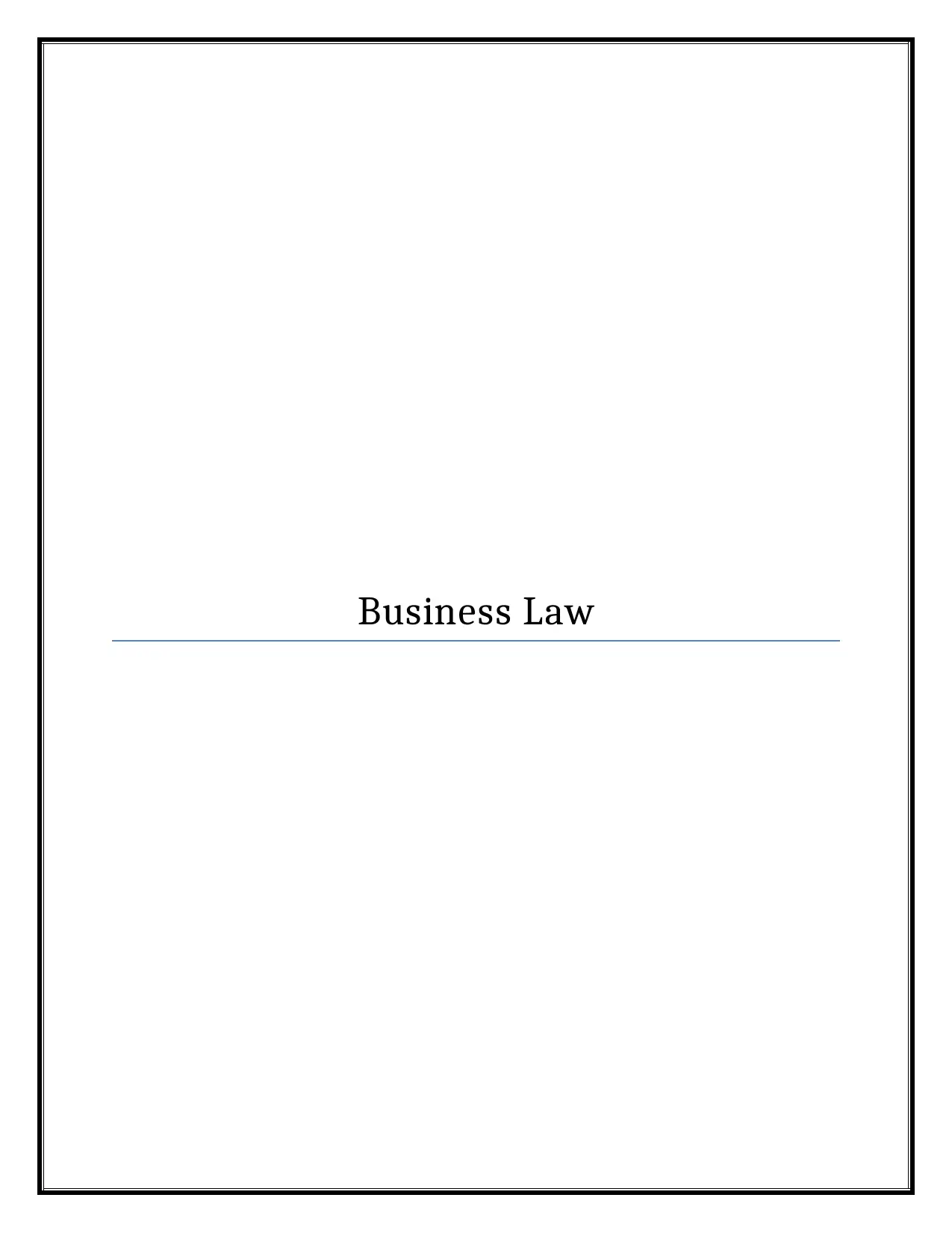
Business Law
Paraphrase This Document
Need a fresh take? Get an instant paraphrase of this document with our AI Paraphraser
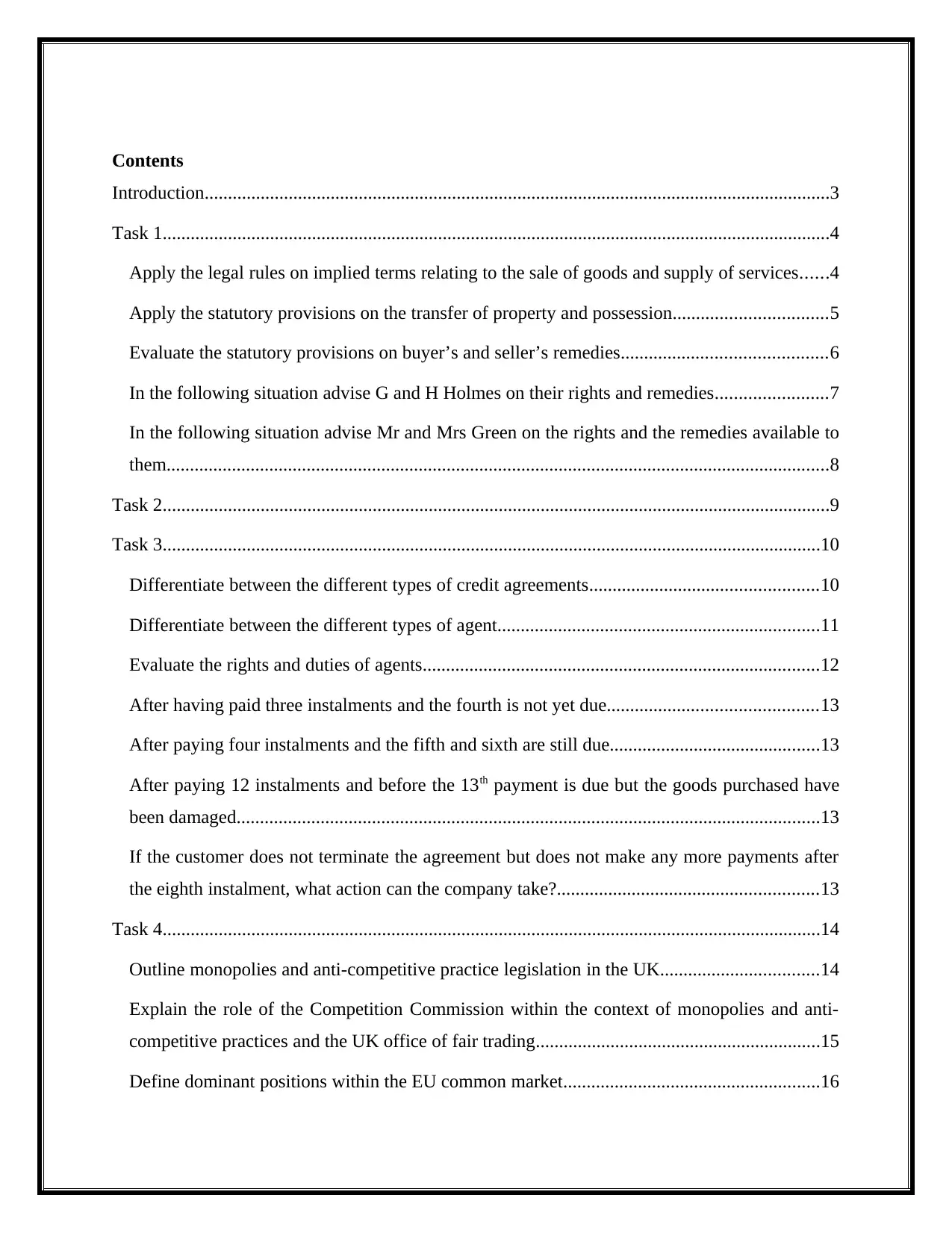
Contents
Introduction......................................................................................................................................3
Task 1...............................................................................................................................................4
Apply the legal rules on implied terms relating to the sale of goods and supply of services......4
Apply the statutory provisions on the transfer of property and possession.................................5
Evaluate the statutory provisions on buyer’s and seller’s remedies............................................6
In the following situation advise G and H Holmes on their rights and remedies........................7
In the following situation advise Mr and Mrs Green on the rights and the remedies available to
them..............................................................................................................................................8
Task 2...............................................................................................................................................9
Task 3.............................................................................................................................................10
Differentiate between the different types of credit agreements.................................................10
Differentiate between the different types of agent.....................................................................11
Evaluate the rights and duties of agents.....................................................................................12
After having paid three instalments and the fourth is not yet due.............................................13
After paying four instalments and the fifth and sixth are still due.............................................13
After paying 12 instalments and before the 13th payment is due but the goods purchased have
been damaged.............................................................................................................................13
If the customer does not terminate the agreement but does not make any more payments after
the eighth instalment, what action can the company take?........................................................13
Task 4.............................................................................................................................................14
Outline monopolies and anti-competitive practice legislation in the UK..................................14
Explain the role of the Competition Commission within the context of monopolies and anti-
competitive practices and the UK office of fair trading.............................................................15
Define dominant positions within the EU common market.......................................................16
Introduction......................................................................................................................................3
Task 1...............................................................................................................................................4
Apply the legal rules on implied terms relating to the sale of goods and supply of services......4
Apply the statutory provisions on the transfer of property and possession.................................5
Evaluate the statutory provisions on buyer’s and seller’s remedies............................................6
In the following situation advise G and H Holmes on their rights and remedies........................7
In the following situation advise Mr and Mrs Green on the rights and the remedies available to
them..............................................................................................................................................8
Task 2...............................................................................................................................................9
Task 3.............................................................................................................................................10
Differentiate between the different types of credit agreements.................................................10
Differentiate between the different types of agent.....................................................................11
Evaluate the rights and duties of agents.....................................................................................12
After having paid three instalments and the fourth is not yet due.............................................13
After paying four instalments and the fifth and sixth are still due.............................................13
After paying 12 instalments and before the 13th payment is due but the goods purchased have
been damaged.............................................................................................................................13
If the customer does not terminate the agreement but does not make any more payments after
the eighth instalment, what action can the company take?........................................................13
Task 4.............................................................................................................................................14
Outline monopolies and anti-competitive practice legislation in the UK..................................14
Explain the role of the Competition Commission within the context of monopolies and anti-
competitive practices and the UK office of fair trading.............................................................15
Define dominant positions within the EU common market.......................................................16
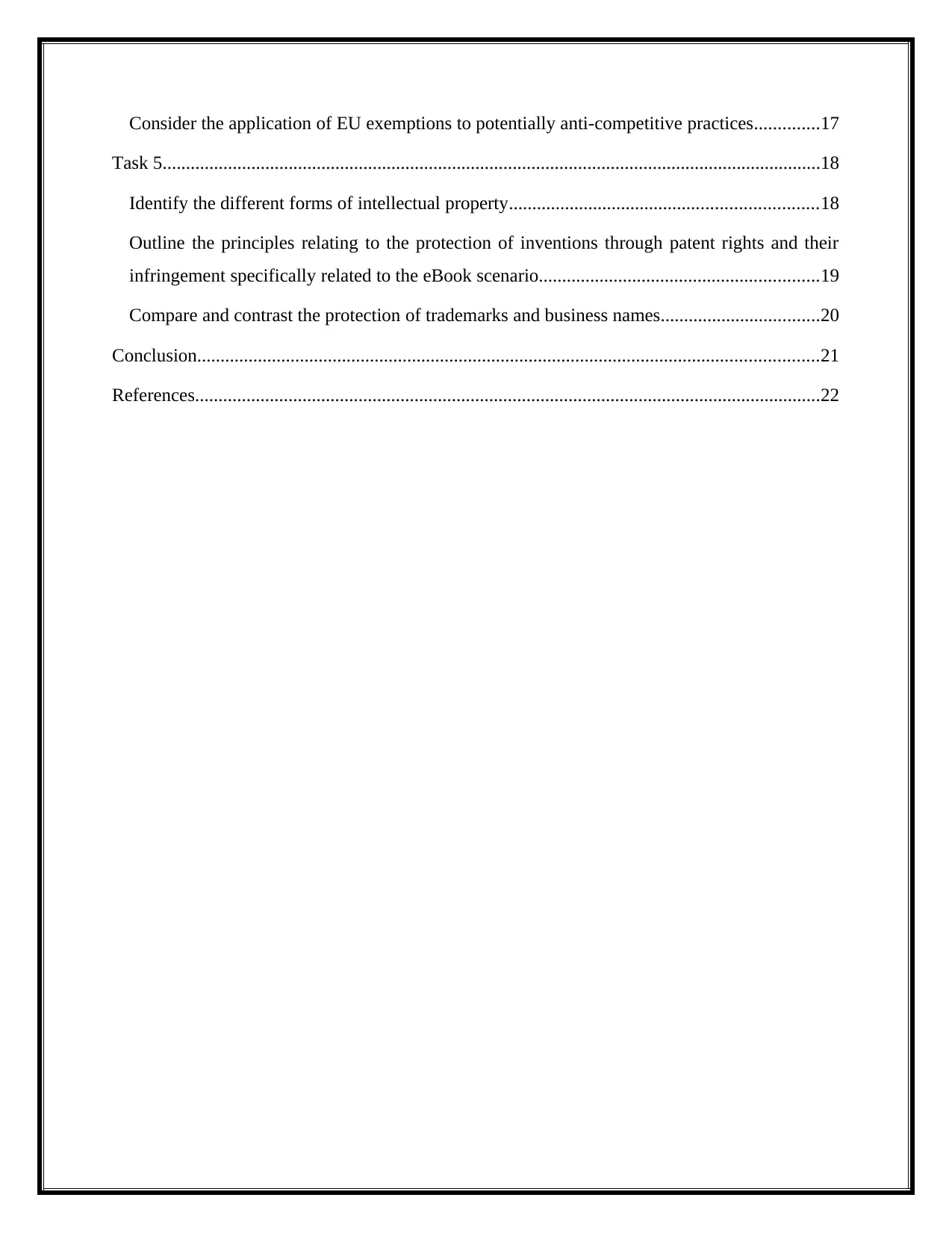
Consider the application of EU exemptions to potentially anti-competitive practices..............17
Task 5.............................................................................................................................................18
Identify the different forms of intellectual property..................................................................18
Outline the principles relating to the protection of inventions through patent rights and their
infringement specifically related to the eBook scenario............................................................19
Compare and contrast the protection of trademarks and business names..................................20
Conclusion.....................................................................................................................................21
References......................................................................................................................................22
Task 5.............................................................................................................................................18
Identify the different forms of intellectual property..................................................................18
Outline the principles relating to the protection of inventions through patent rights and their
infringement specifically related to the eBook scenario............................................................19
Compare and contrast the protection of trademarks and business names..................................20
Conclusion.....................................................................................................................................21
References......................................................................................................................................22
⊘ This is a preview!⊘
Do you want full access?
Subscribe today to unlock all pages.

Trusted by 1+ million students worldwide
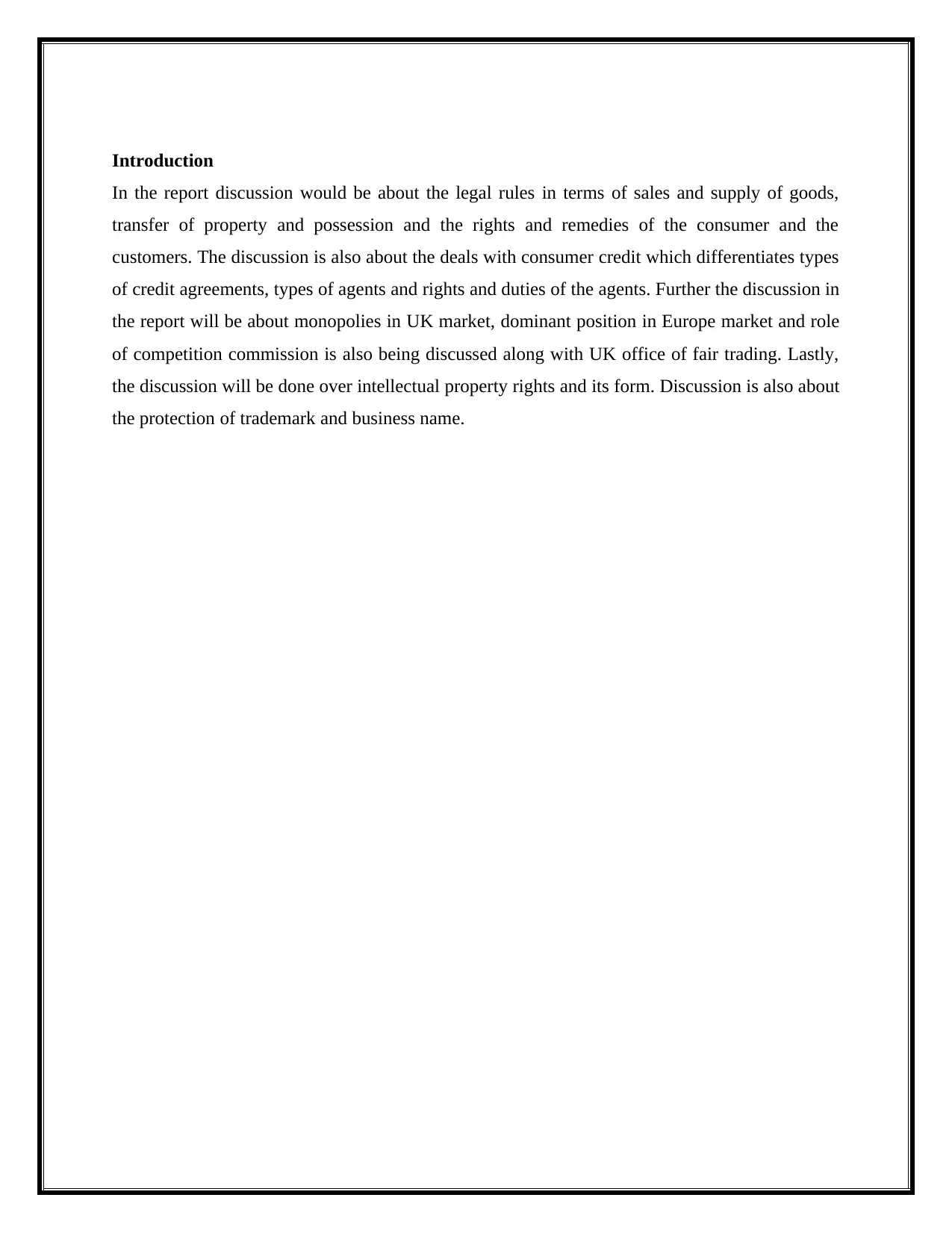
Introduction
In the report discussion would be about the legal rules in terms of sales and supply of goods,
transfer of property and possession and the rights and remedies of the consumer and the
customers. The discussion is also about the deals with consumer credit which differentiates types
of credit agreements, types of agents and rights and duties of the agents. Further the discussion in
the report will be about monopolies in UK market, dominant position in Europe market and role
of competition commission is also being discussed along with UK office of fair trading. Lastly,
the discussion will be done over intellectual property rights and its form. Discussion is also about
the protection of trademark and business name.
In the report discussion would be about the legal rules in terms of sales and supply of goods,
transfer of property and possession and the rights and remedies of the consumer and the
customers. The discussion is also about the deals with consumer credit which differentiates types
of credit agreements, types of agents and rights and duties of the agents. Further the discussion in
the report will be about monopolies in UK market, dominant position in Europe market and role
of competition commission is also being discussed along with UK office of fair trading. Lastly,
the discussion will be done over intellectual property rights and its form. Discussion is also about
the protection of trademark and business name.
Paraphrase This Document
Need a fresh take? Get an instant paraphrase of this document with our AI Paraphraser
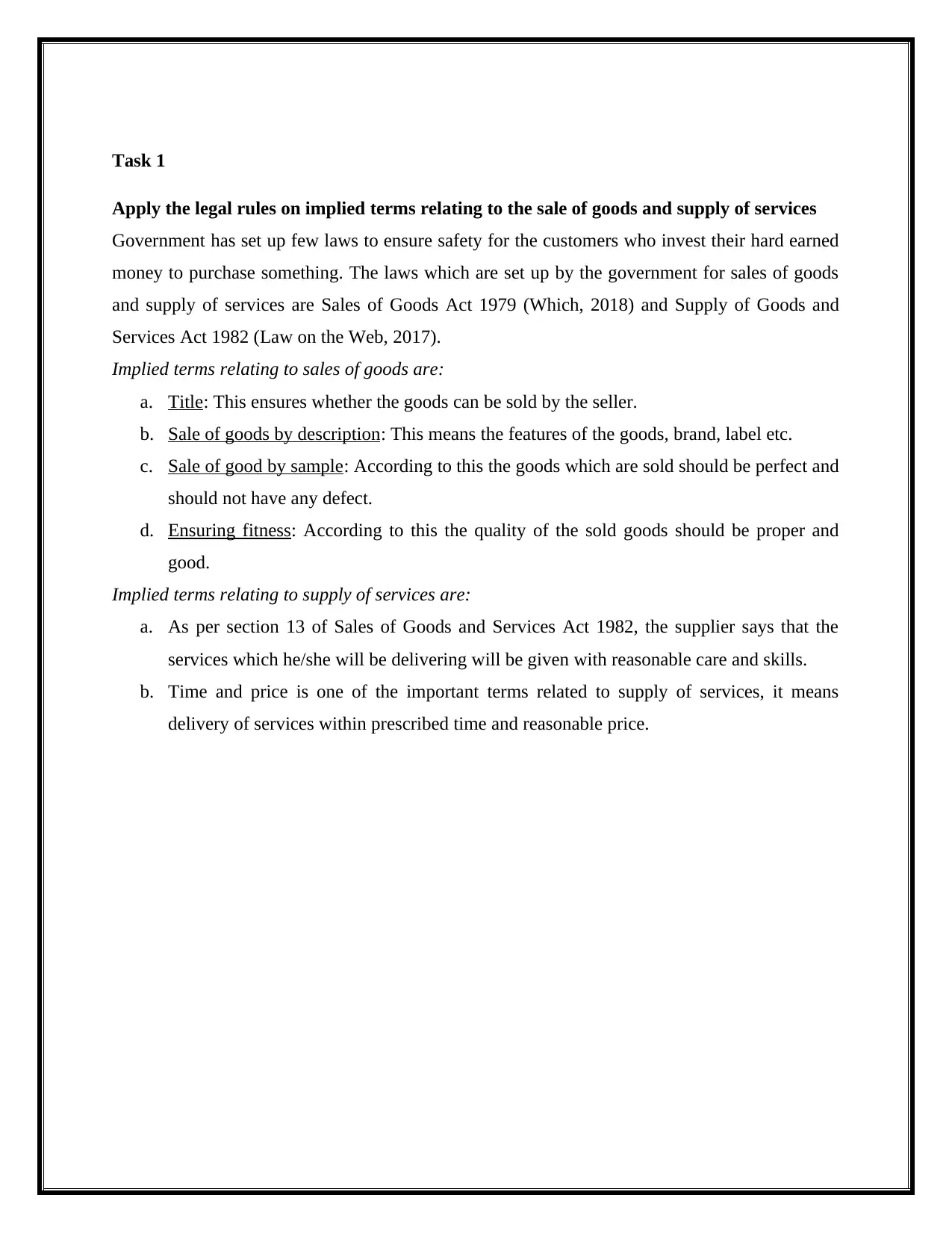
Task 1
Apply the legal rules on implied terms relating to the sale of goods and supply of services
Government has set up few laws to ensure safety for the customers who invest their hard earned
money to purchase something. The laws which are set up by the government for sales of goods
and supply of services are Sales of Goods Act 1979 (Which, 2018) and Supply of Goods and
Services Act 1982 (Law on the Web, 2017).
Implied terms relating to sales of goods are:
a. Title: This ensures whether the goods can be sold by the seller.
b. Sale of goods by description: This means the features of the goods, brand, label etc.
c. Sale of good by sample: According to this the goods which are sold should be perfect and
should not have any defect.
d. Ensuring fitness: According to this the quality of the sold goods should be proper and
good.
Implied terms relating to supply of services are:
a. As per section 13 of Sales of Goods and Services Act 1982, the supplier says that the
services which he/she will be delivering will be given with reasonable care and skills.
b. Time and price is one of the important terms related to supply of services, it means
delivery of services within prescribed time and reasonable price.
Apply the legal rules on implied terms relating to the sale of goods and supply of services
Government has set up few laws to ensure safety for the customers who invest their hard earned
money to purchase something. The laws which are set up by the government for sales of goods
and supply of services are Sales of Goods Act 1979 (Which, 2018) and Supply of Goods and
Services Act 1982 (Law on the Web, 2017).
Implied terms relating to sales of goods are:
a. Title: This ensures whether the goods can be sold by the seller.
b. Sale of goods by description: This means the features of the goods, brand, label etc.
c. Sale of good by sample: According to this the goods which are sold should be perfect and
should not have any defect.
d. Ensuring fitness: According to this the quality of the sold goods should be proper and
good.
Implied terms relating to supply of services are:
a. As per section 13 of Sales of Goods and Services Act 1982, the supplier says that the
services which he/she will be delivering will be given with reasonable care and skills.
b. Time and price is one of the important terms related to supply of services, it means
delivery of services within prescribed time and reasonable price.
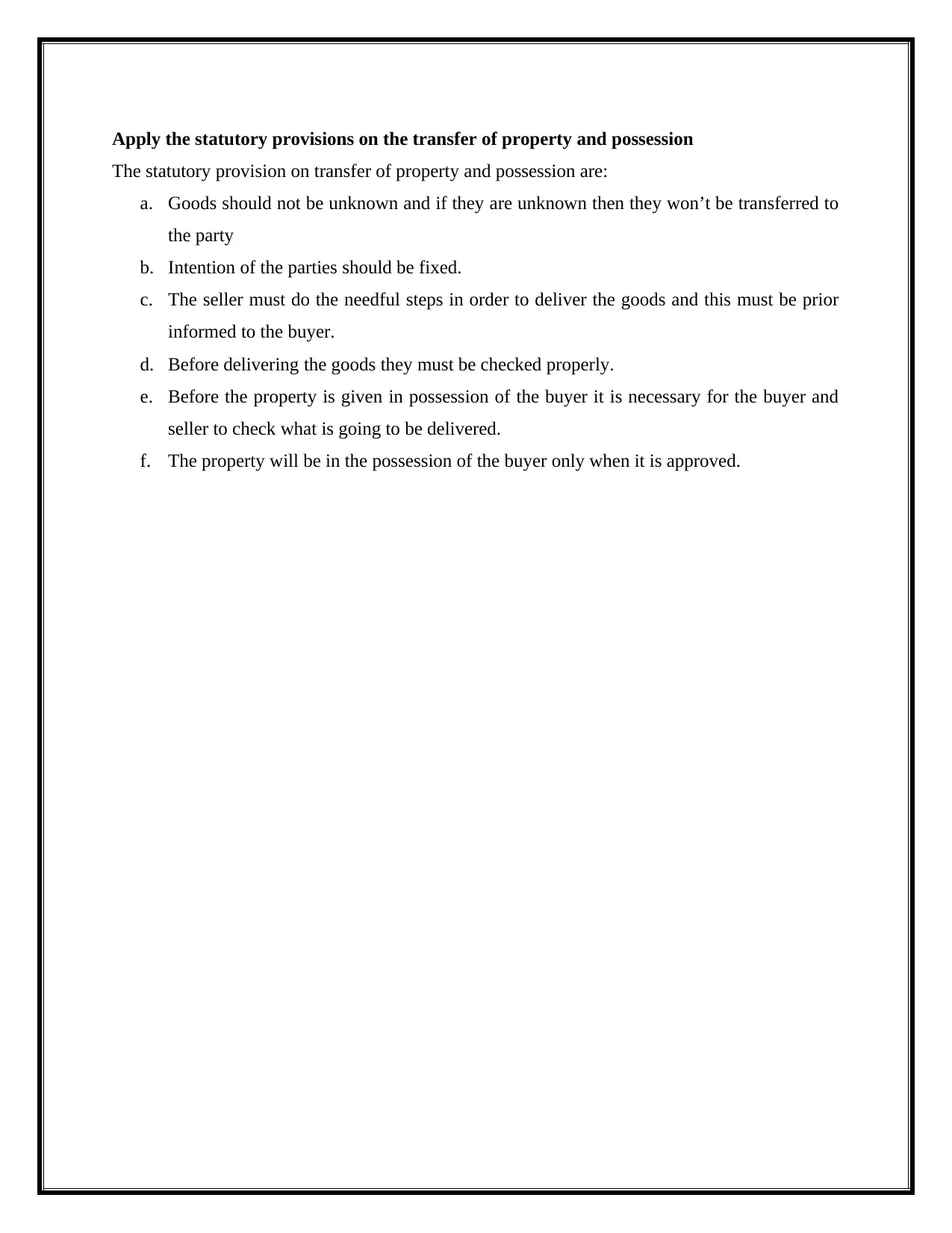
Apply the statutory provisions on the transfer of property and possession
The statutory provision on transfer of property and possession are:
a. Goods should not be unknown and if they are unknown then they won’t be transferred to
the party
b. Intention of the parties should be fixed.
c. The seller must do the needful steps in order to deliver the goods and this must be prior
informed to the buyer.
d. Before delivering the goods they must be checked properly.
e. Before the property is given in possession of the buyer it is necessary for the buyer and
seller to check what is going to be delivered.
f. The property will be in the possession of the buyer only when it is approved.
The statutory provision on transfer of property and possession are:
a. Goods should not be unknown and if they are unknown then they won’t be transferred to
the party
b. Intention of the parties should be fixed.
c. The seller must do the needful steps in order to deliver the goods and this must be prior
informed to the buyer.
d. Before delivering the goods they must be checked properly.
e. Before the property is given in possession of the buyer it is necessary for the buyer and
seller to check what is going to be delivered.
f. The property will be in the possession of the buyer only when it is approved.
⊘ This is a preview!⊘
Do you want full access?
Subscribe today to unlock all pages.

Trusted by 1+ million students worldwide
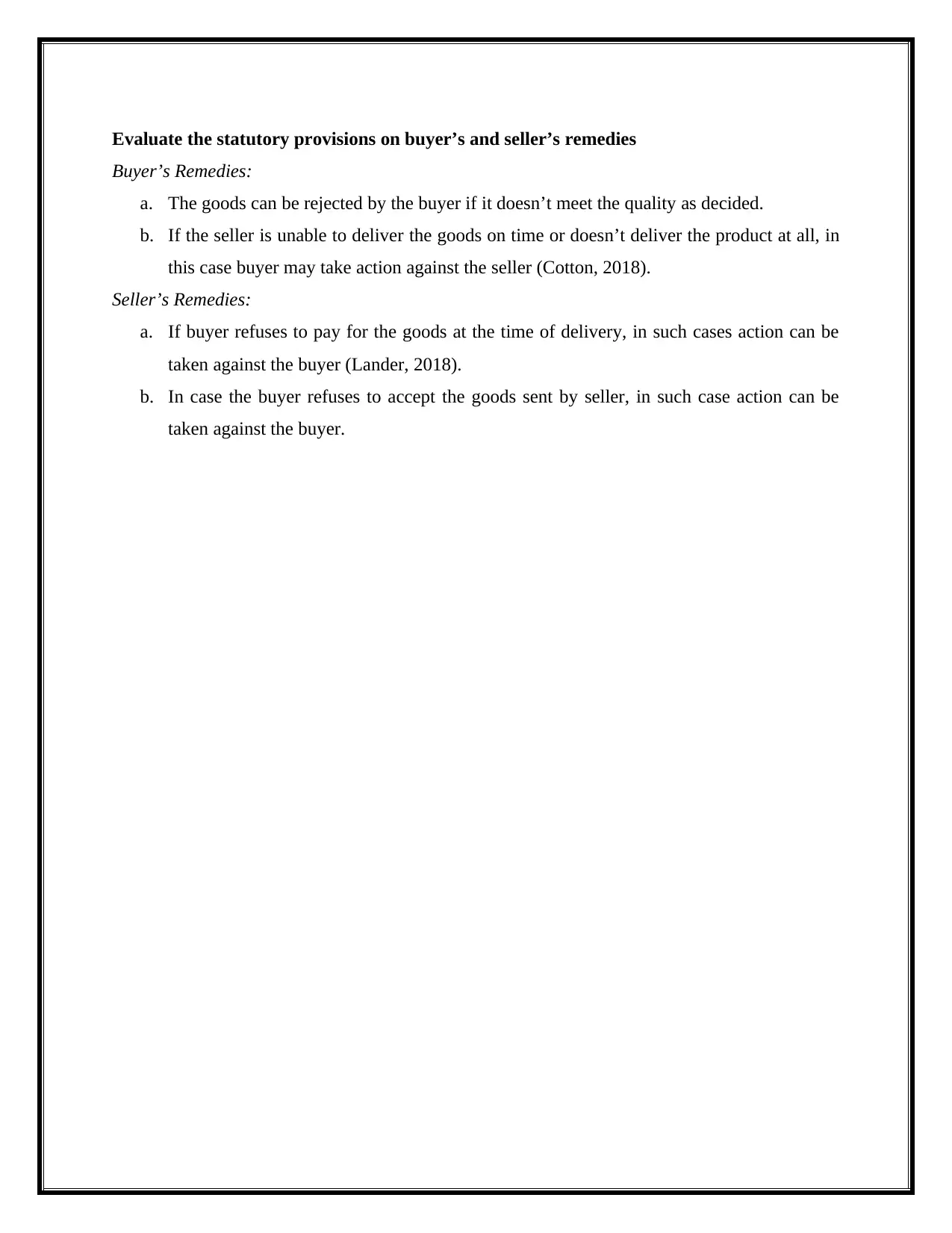
Evaluate the statutory provisions on buyer’s and seller’s remedies
Buyer’s Remedies:
a. The goods can be rejected by the buyer if it doesn’t meet the quality as decided.
b. If the seller is unable to deliver the goods on time or doesn’t deliver the product at all, in
this case buyer may take action against the seller (Cotton, 2018).
Seller’s Remedies:
a. If buyer refuses to pay for the goods at the time of delivery, in such cases action can be
taken against the buyer (Lander, 2018).
b. In case the buyer refuses to accept the goods sent by seller, in such case action can be
taken against the buyer.
Buyer’s Remedies:
a. The goods can be rejected by the buyer if it doesn’t meet the quality as decided.
b. If the seller is unable to deliver the goods on time or doesn’t deliver the product at all, in
this case buyer may take action against the seller (Cotton, 2018).
Seller’s Remedies:
a. If buyer refuses to pay for the goods at the time of delivery, in such cases action can be
taken against the buyer (Lander, 2018).
b. In case the buyer refuses to accept the goods sent by seller, in such case action can be
taken against the buyer.
Paraphrase This Document
Need a fresh take? Get an instant paraphrase of this document with our AI Paraphraser
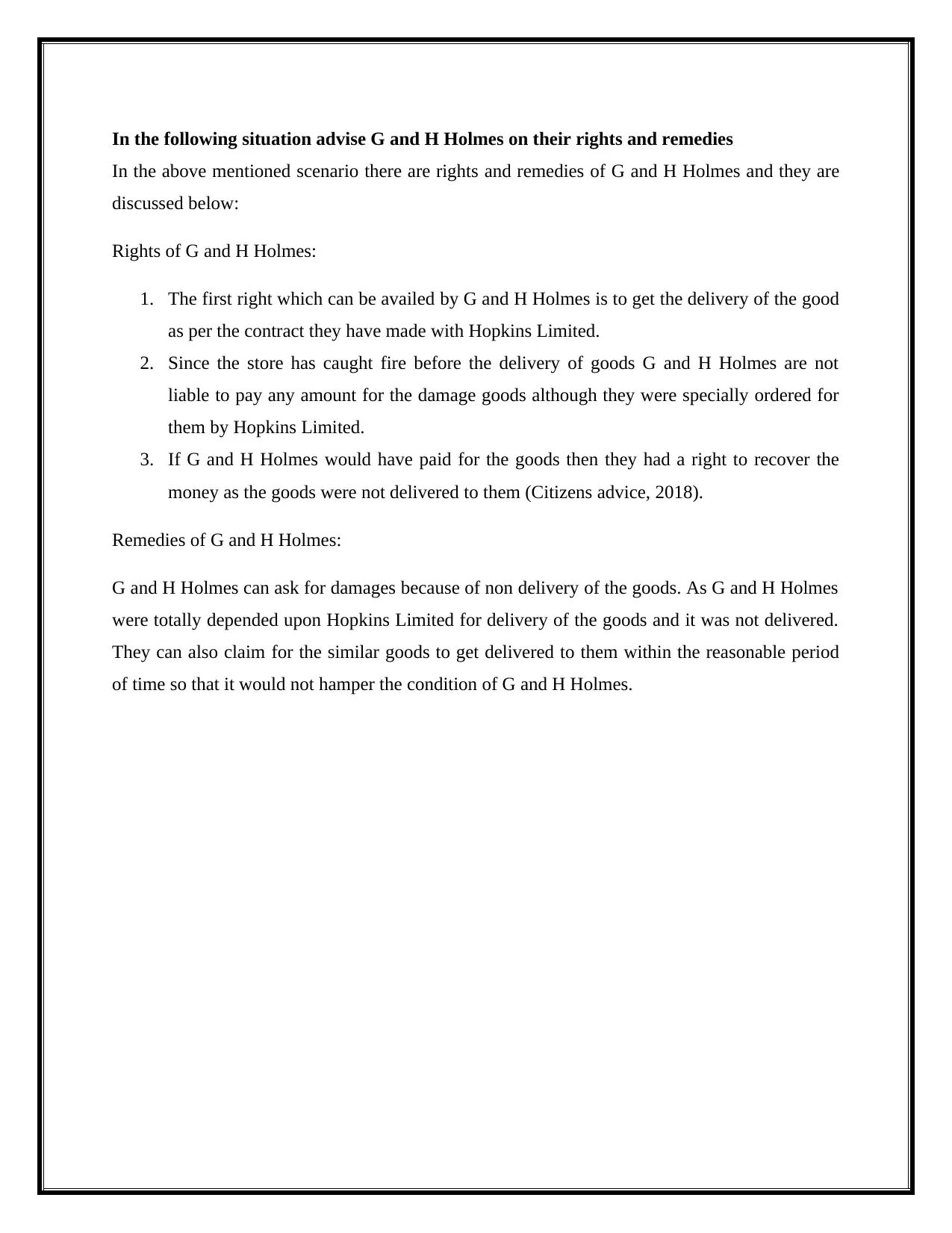
In the following situation advise G and H Holmes on their rights and remedies
In the above mentioned scenario there are rights and remedies of G and H Holmes and they are
discussed below:
Rights of G and H Holmes:
1. The first right which can be availed by G and H Holmes is to get the delivery of the good
as per the contract they have made with Hopkins Limited.
2. Since the store has caught fire before the delivery of goods G and H Holmes are not
liable to pay any amount for the damage goods although they were specially ordered for
them by Hopkins Limited.
3. If G and H Holmes would have paid for the goods then they had a right to recover the
money as the goods were not delivered to them (Citizens advice, 2018).
Remedies of G and H Holmes:
G and H Holmes can ask for damages because of non delivery of the goods. As G and H Holmes
were totally depended upon Hopkins Limited for delivery of the goods and it was not delivered.
They can also claim for the similar goods to get delivered to them within the reasonable period
of time so that it would not hamper the condition of G and H Holmes.
In the above mentioned scenario there are rights and remedies of G and H Holmes and they are
discussed below:
Rights of G and H Holmes:
1. The first right which can be availed by G and H Holmes is to get the delivery of the good
as per the contract they have made with Hopkins Limited.
2. Since the store has caught fire before the delivery of goods G and H Holmes are not
liable to pay any amount for the damage goods although they were specially ordered for
them by Hopkins Limited.
3. If G and H Holmes would have paid for the goods then they had a right to recover the
money as the goods were not delivered to them (Citizens advice, 2018).
Remedies of G and H Holmes:
G and H Holmes can ask for damages because of non delivery of the goods. As G and H Holmes
were totally depended upon Hopkins Limited for delivery of the goods and it was not delivered.
They can also claim for the similar goods to get delivered to them within the reasonable period
of time so that it would not hamper the condition of G and H Holmes.
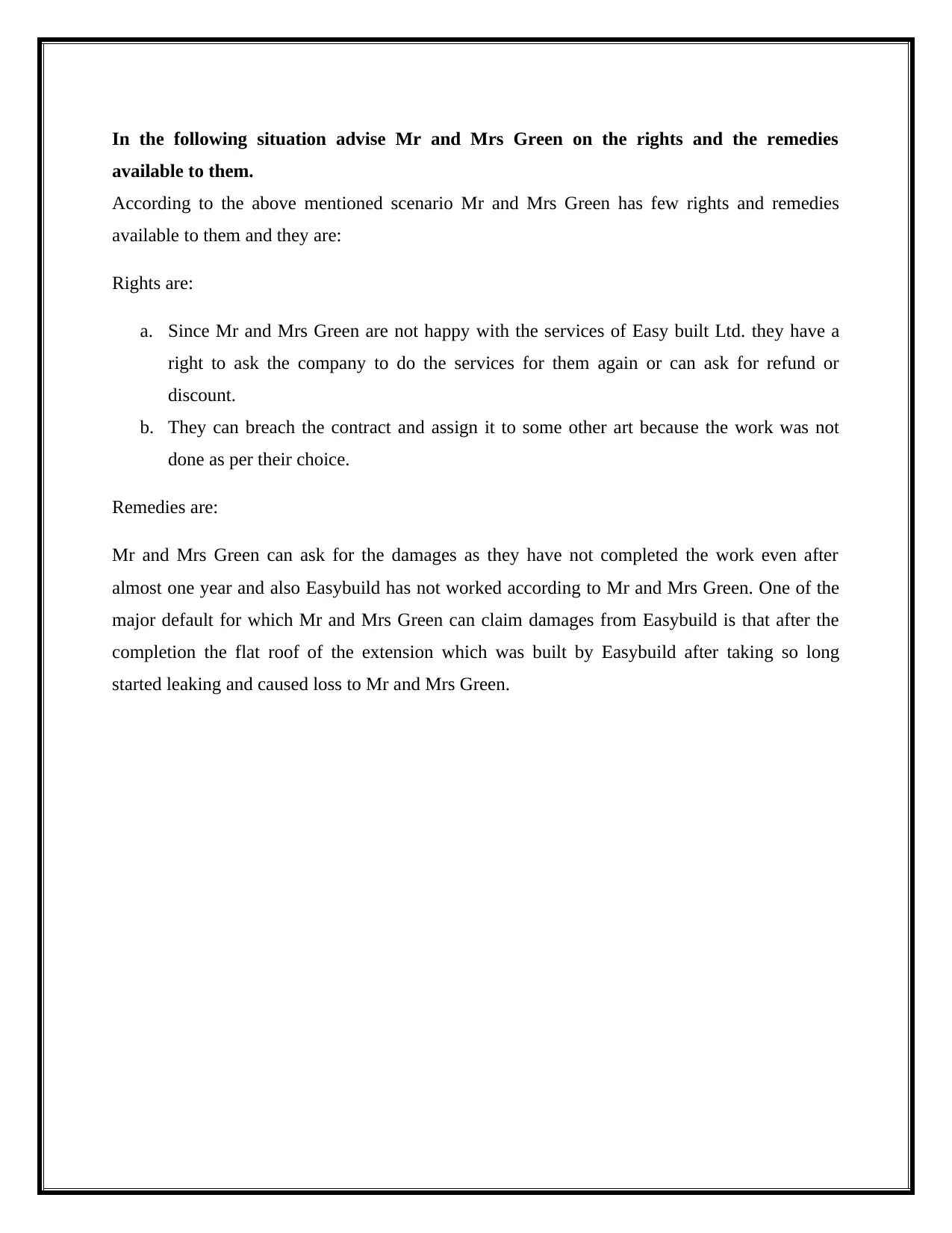
In the following situation advise Mr and Mrs Green on the rights and the remedies
available to them.
According to the above mentioned scenario Mr and Mrs Green has few rights and remedies
available to them and they are:
Rights are:
a. Since Mr and Mrs Green are not happy with the services of Easy built Ltd. they have a
right to ask the company to do the services for them again or can ask for refund or
discount.
b. They can breach the contract and assign it to some other art because the work was not
done as per their choice.
Remedies are:
Mr and Mrs Green can ask for the damages as they have not completed the work even after
almost one year and also Easybuild has not worked according to Mr and Mrs Green. One of the
major default for which Mr and Mrs Green can claim damages from Easybuild is that after the
completion the flat roof of the extension which was built by Easybuild after taking so long
started leaking and caused loss to Mr and Mrs Green.
available to them.
According to the above mentioned scenario Mr and Mrs Green has few rights and remedies
available to them and they are:
Rights are:
a. Since Mr and Mrs Green are not happy with the services of Easy built Ltd. they have a
right to ask the company to do the services for them again or can ask for refund or
discount.
b. They can breach the contract and assign it to some other art because the work was not
done as per their choice.
Remedies are:
Mr and Mrs Green can ask for the damages as they have not completed the work even after
almost one year and also Easybuild has not worked according to Mr and Mrs Green. One of the
major default for which Mr and Mrs Green can claim damages from Easybuild is that after the
completion the flat roof of the extension which was built by Easybuild after taking so long
started leaking and caused loss to Mr and Mrs Green.
⊘ This is a preview!⊘
Do you want full access?
Subscribe today to unlock all pages.

Trusted by 1+ million students worldwide
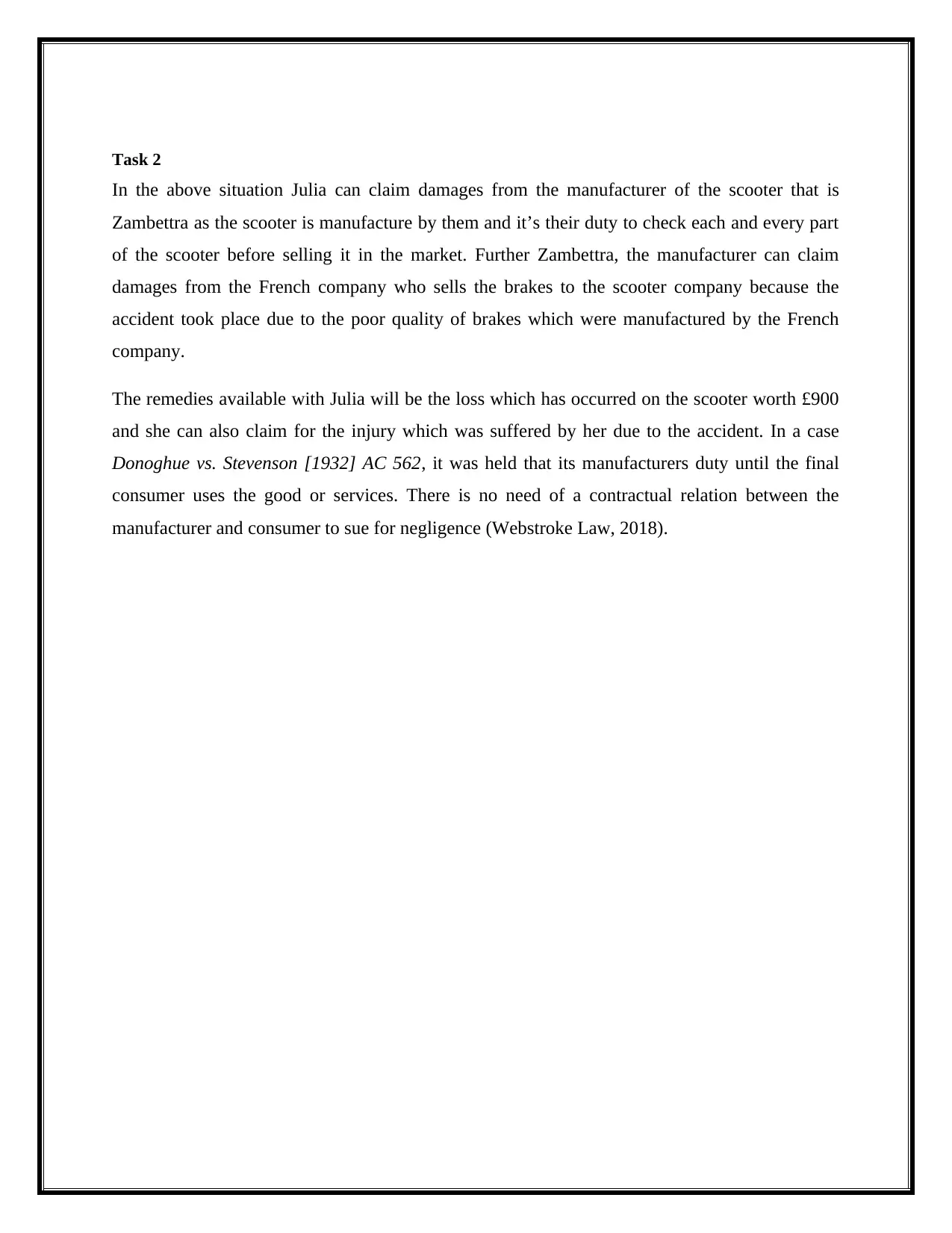
Task 2
In the above situation Julia can claim damages from the manufacturer of the scooter that is
Zambettra as the scooter is manufacture by them and it’s their duty to check each and every part
of the scooter before selling it in the market. Further Zambettra, the manufacturer can claim
damages from the French company who sells the brakes to the scooter company because the
accident took place due to the poor quality of brakes which were manufactured by the French
company.
The remedies available with Julia will be the loss which has occurred on the scooter worth £900
and she can also claim for the injury which was suffered by her due to the accident. In a case
Donoghue vs. Stevenson [1932] AC 562, it was held that its manufacturers duty until the final
consumer uses the good or services. There is no need of a contractual relation between the
manufacturer and consumer to sue for negligence (Webstroke Law, 2018).
In the above situation Julia can claim damages from the manufacturer of the scooter that is
Zambettra as the scooter is manufacture by them and it’s their duty to check each and every part
of the scooter before selling it in the market. Further Zambettra, the manufacturer can claim
damages from the French company who sells the brakes to the scooter company because the
accident took place due to the poor quality of brakes which were manufactured by the French
company.
The remedies available with Julia will be the loss which has occurred on the scooter worth £900
and she can also claim for the injury which was suffered by her due to the accident. In a case
Donoghue vs. Stevenson [1932] AC 562, it was held that its manufacturers duty until the final
consumer uses the good or services. There is no need of a contractual relation between the
manufacturer and consumer to sue for negligence (Webstroke Law, 2018).
Paraphrase This Document
Need a fresh take? Get an instant paraphrase of this document with our AI Paraphraser
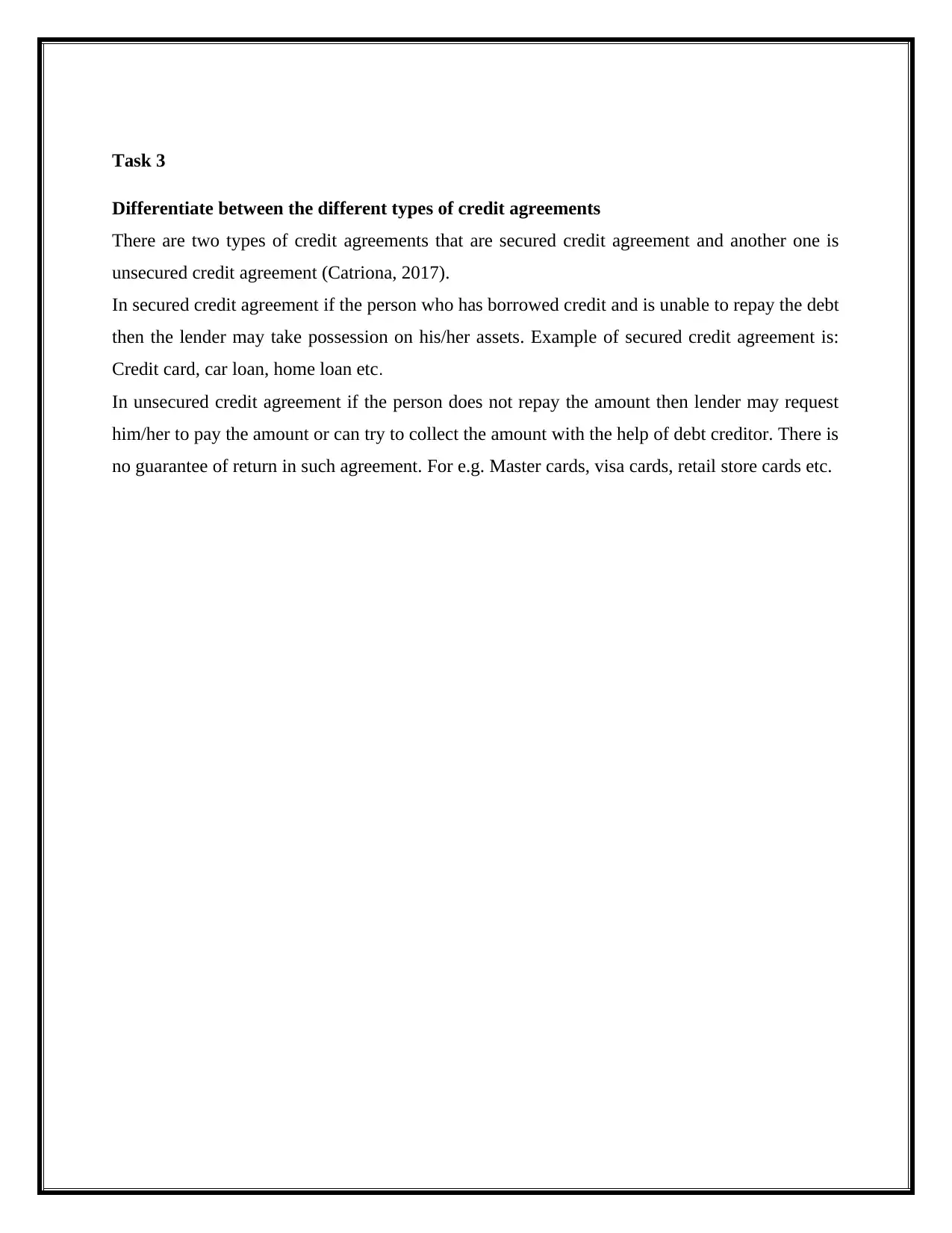
Task 3
Differentiate between the different types of credit agreements
There are two types of credit agreements that are secured credit agreement and another one is
unsecured credit agreement (Catriona, 2017).
In secured credit agreement if the person who has borrowed credit and is unable to repay the debt
then the lender may take possession on his/her assets. Example of secured credit agreement is:
Credit card, car loan, home loan etc.
In unsecured credit agreement if the person does not repay the amount then lender may request
him/her to pay the amount or can try to collect the amount with the help of debt creditor. There is
no guarantee of return in such agreement. For e.g. Master cards, visa cards, retail store cards etc.
Differentiate between the different types of credit agreements
There are two types of credit agreements that are secured credit agreement and another one is
unsecured credit agreement (Catriona, 2017).
In secured credit agreement if the person who has borrowed credit and is unable to repay the debt
then the lender may take possession on his/her assets. Example of secured credit agreement is:
Credit card, car loan, home loan etc.
In unsecured credit agreement if the person does not repay the amount then lender may request
him/her to pay the amount or can try to collect the amount with the help of debt creditor. There is
no guarantee of return in such agreement. For e.g. Master cards, visa cards, retail store cards etc.
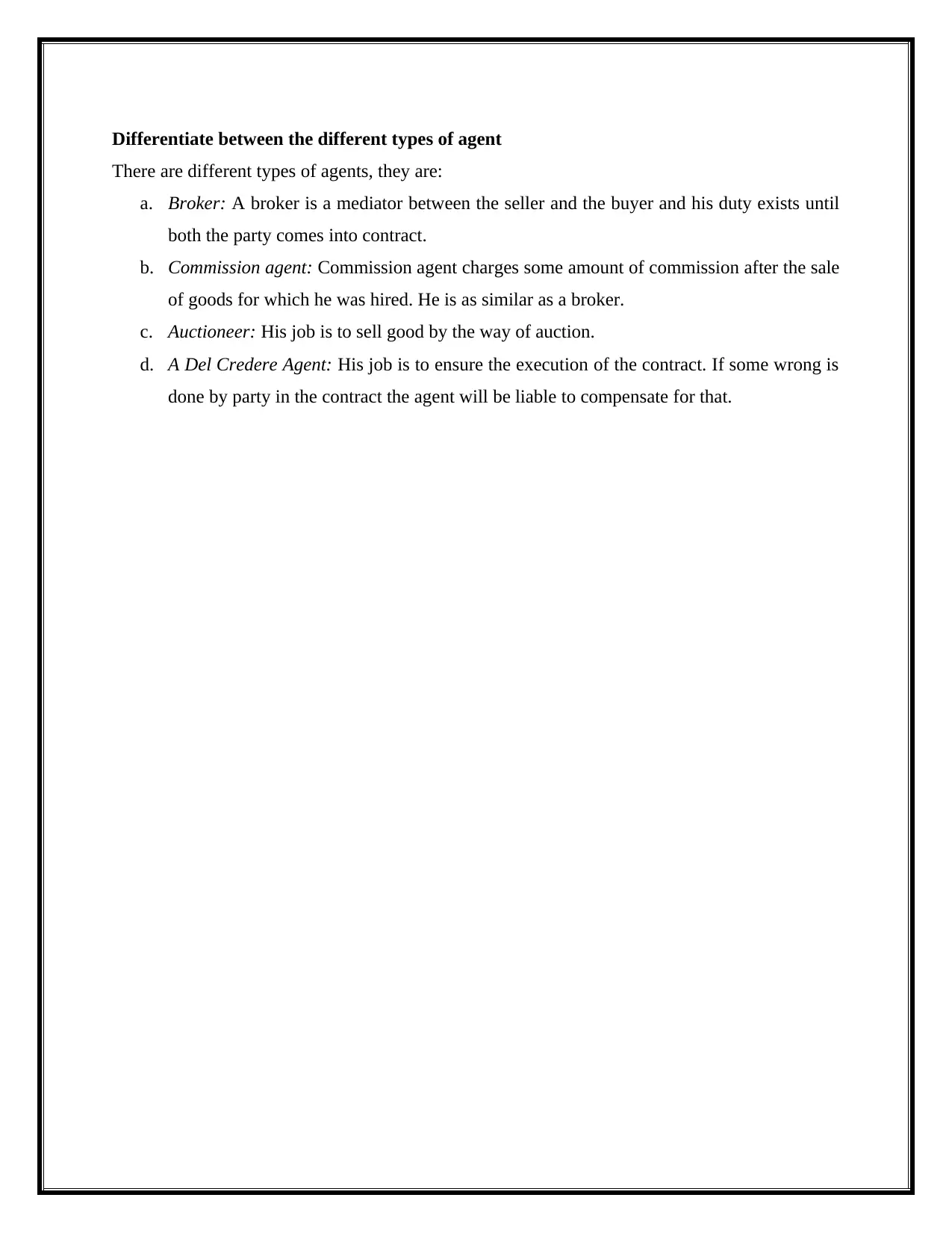
Differentiate between the different types of agent
There are different types of agents, they are:
a. Broker: A broker is a mediator between the seller and the buyer and his duty exists until
both the party comes into contract.
b. Commission agent: Commission agent charges some amount of commission after the sale
of goods for which he was hired. He is as similar as a broker.
c. Auctioneer: His job is to sell good by the way of auction.
d. A Del Credere Agent: His job is to ensure the execution of the contract. If some wrong is
done by party in the contract the agent will be liable to compensate for that.
There are different types of agents, they are:
a. Broker: A broker is a mediator between the seller and the buyer and his duty exists until
both the party comes into contract.
b. Commission agent: Commission agent charges some amount of commission after the sale
of goods for which he was hired. He is as similar as a broker.
c. Auctioneer: His job is to sell good by the way of auction.
d. A Del Credere Agent: His job is to ensure the execution of the contract. If some wrong is
done by party in the contract the agent will be liable to compensate for that.
⊘ This is a preview!⊘
Do you want full access?
Subscribe today to unlock all pages.

Trusted by 1+ million students worldwide
1 out of 24
Related Documents
Your All-in-One AI-Powered Toolkit for Academic Success.
+13062052269
info@desklib.com
Available 24*7 on WhatsApp / Email
![[object Object]](/_next/static/media/star-bottom.7253800d.svg)
Unlock your academic potential
Copyright © 2020–2026 A2Z Services. All Rights Reserved. Developed and managed by ZUCOL.





